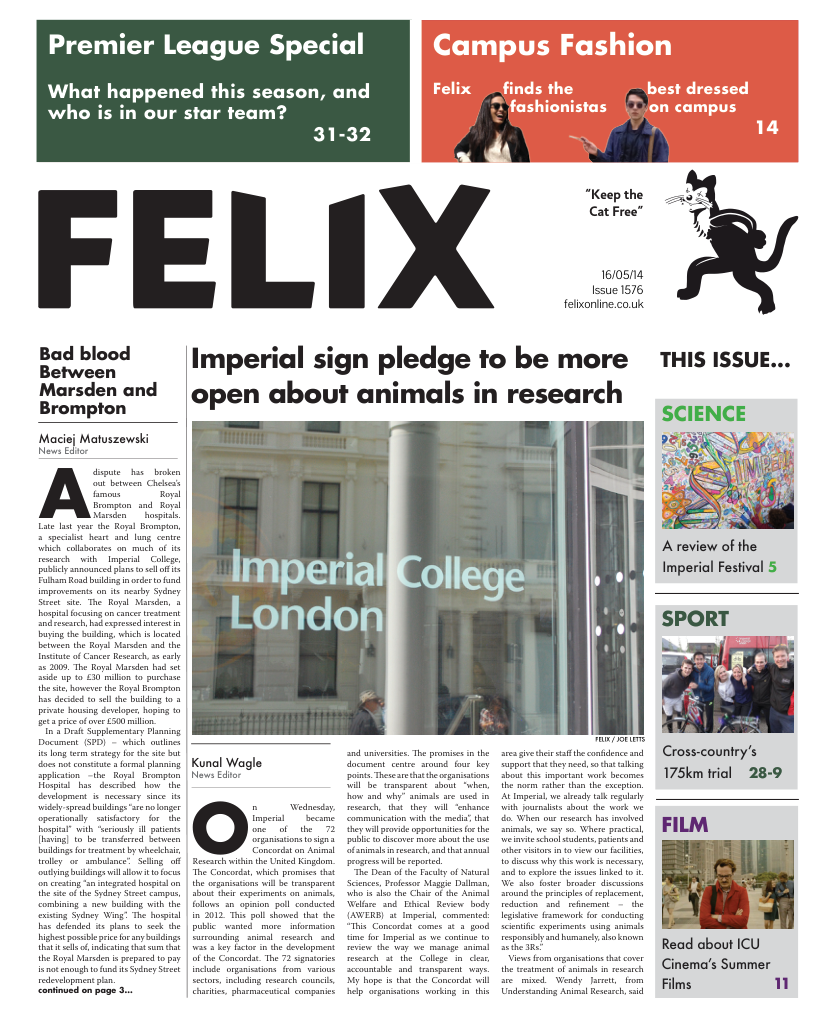Imperial sign pledge to be more open about animals in research
On Wednesday, Imperial became one of the 72 organisations to sign a Concordat on Animal Research within the United Kingdom. The Concordat, which promises that the organisations will be transparent about their experiments on animals, follows an opinion poll conducted in 2012.

On Wednesday, Imperial became one of the 72 organisations to sign a Concordat on Animal Research within the United Kingdom. The Concordat, which promises that the organisations will be transparent about their experiments on animals, follows an opinion poll conducted in 2012. This poll showed that the public wanted more information surrounding animal research and was a key factor in the development of the Concordat. The 72 signatories include organisations from various sectors, including research councils, charities, pharmaceutical companies and universities. The promises in the document centre around four key points. These are that the organisations will be transparent about “when, how and why” animals are used in research, that they will “enhance communication with the media”, that they will provide opportunities for the public to discover more about the use of animals in research, and that annual progress will be reported.
The Dean of the Faculty of Natural Sciences, Professor Maggie Dallman, who is also the Chair of the Animal Welfare and Ethical Review body (AWERB) at Imperial, commented: “This Concordat comes at a good time for Imperial as we continue to review the way we manage animal research at the College in clear, accountable and transparent ways. My hope is that the Concordat will help organisations working in this area give their staff the confidence and support that they need, so that talking about this important work becomes the norm rather than the exception. At Imperial, we already talk regularly with journalists about the work we do. When our research has involved animals, we say so. Where practical, we invite school students, patients and other visitors in to view our facilities, to discuss why this work is necessary, and to explore the issues linked to it. We also foster broader discussions around the principles of replacement, reduction and refinement – the legislative framework for conducting scientific experiments using animals responsibly and humanely, also known as the 3Rs.”
Views from organisations that cover the treatment of animals in research are mixed. Wendy Jarrett, from Understanding Animal Research, said of the Concordat “This is an excellent opportunity to dispel myths and give the public a chance to see the ground-breaking research that is being done on its behalf”. However, Michelle Thew, who is from the British Union for the Abolition of Vivisection, was of a different opinion. She pointed out that while it is a “step towards genuine awareness” it is also a case of “transparency on their terms. The Concordat is choosing to give what they want to give”.
This is not the only time that Imperial College has been in the news with regards to the use of animals in research in the recent past. In February Felix reported that the College had published a new “Action plan for world class animal research”. This was following an independent inquiry into allegations by the British Union that Imperial College London may have been guilty of animal abuse when conducting research (reported by Felix in May of last year). Professor Steve Brown, who is Director of the Medical Research Council’s Mammalian Genetics Unit at Harwell, headed the committee. Imperial accepted all the recommendations of the Brown report, and through its action plan have showed how they intend to tackle the issues raised in the report.
At the time of the report, Professor Brown noted that whilst the report “commended the College’s animal care staff”, there will still some key issues. He said that the investigation “identified a number of serious concerns on the conduct, management and oversight of animal research at Imperial College” and that “Imperial College is internationally recognised as one of the world’s best research institutes and it is important that this is matched by its standards of animal use and welfare.”






